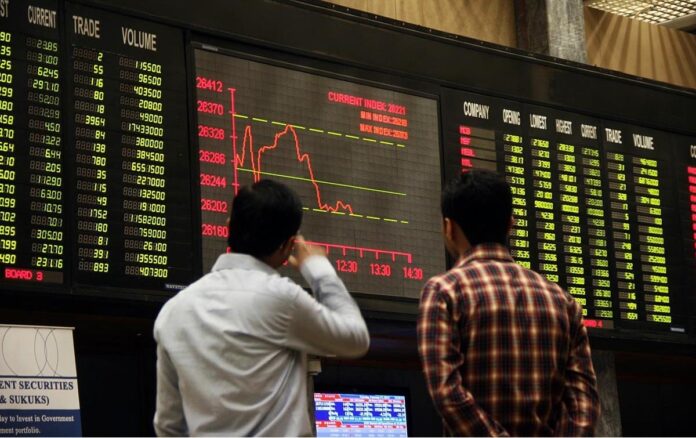The stock market is not an accurate indicator of the economy, but the stock market does move based on changes in the economy and what investors expect from the future. One such event that has an impact on the capital markets is the budget.
Without going into much detail, it is very evident that the government wants to provide stimulus and encourage investment in the Pakistan Stock Market (PSX). This is visible in the fact that the government has decided to cut Capital Gains Tax (CGT) by 2.5 per cent for filers, bringing it down to 12.5 per cent from 15 per cent.
The government has also removed the withholding tax on gross income earned on margin financing transactions. As a result of these decisions, it is likely that one will see increased volumes traded at the PSX in addition to a likely increase in foreign investors. In addition to this, tax exemptions and concessions have been granted to Roshan Digital Account holders.
Moreover, the corporate tax rate is maintained at 29% which is taken well by the market.
Speaking to Profit on the potential growth in capital market investors Shahid Ali Habib, Chief Executive Officer (CEO) of Arif Habib Limited said, “Not only will the reduction of CGT result in more investors, but the potential growth in listed companies will also be a reason.”
“It is surely a pro-growth and business-friendly budget that focuses on local productivity growth by reducing duties on raw materials, import-substitution, and incentivizing exports. The budget has a lower overall tax burden with focus on increasing the tax net.”
What does the budget mean for sectors?
The budget has so far been hailed as a business-oriented budget and is not negative for any sector. This goes in line with the government’s growth-centric approach.
The budget is favorable for the cement, automobile, textile, pharma, leather and tanneries, and steel industries.
As per a report by AHL Research titled ‘Growth in Full Throttle’, “The budget appears positive for the cement sector as a massive allocation for the national PSDP at Rs2,135 billion (highest ever; federal PSDP at Rs900 billion against Rs650 billion last year with Rs1,235 billion set aside for provinces), should encourage development in the country and hence, propel cement demand”. In addition to this, the cement sector will also experience growth due to the Naya Pakistan Housing Authority initiative, Naya Pakistan mark-up subsidy, construction of Dasu, Diamer-Bhasha, Mohmand, and Neelum Jhelum dams, in addition to the Karachi transformation plan.
As for the textile sector, the budget has resulted in a slash in turnover tax bringing it down to 1.25 per cent from 1.5 per cent. Customer duties have been reduced or exempted. Additionally, the regulatory duty on the import of raw material has also decreased to help the sector grow and remain competitive in international markets.
As for the automobile sector, the budget will likely result in increased sales as the sales tax has been reduced from 17 per cent to 12.5 per cent. In addition to this, the Federal Excise Duty (FED) has been abolished on small cars up to 850cc. The sales tax on electric cars has been slashed to 1 per cent from 17 per cent. In order to further encourage greener cars, the government has granted an exemption on the import of CKD kits for EVs.
The budget also serves to be positive for the flat and long steel sector as the custom duties on import of raw materials have been slashed. As per the report by AHL Research, “this will materially reduce (~PKR 9,000/ton) manufacturing cost of CRC / Galvanized steel”. In addition to this, the Naya Pakistan Housing Scheme may result in a demand for rebars.
For the pharmaceutical industry, the government has announced an exemption of customs duty and additional customs duties on more than 350 APIs. The duties on six lifesaving drugs have also been dropped. In addition to this, in order to encourage expansion, a 5 per cent concessionary rate on the import of plant, machinery, and equipment has been announced.
As a result of the reduction of duties on raw material imports, the leather and tannery industry will likely grow. In addition to the reduction in duties, the regulatory duties the industry faced while exporting hides have been reduced too.
The budget is neutral in terms of its impact on banks. However, it is important to note that withholding taxes on banking transactions have been abolished. The budget also proves to be neutral for the power sector, OMCs, and chemical sector.
What does this mean for the market?
“Market will take this budget very positively on Monday. In the long term, companies’ profitability will rise and positively impact valuations,” says Habib.
Keeping in mind the pro-business stances the government has taken, businesses are likely to improve their performance. Investors often base their investments on such news.
It is important to note that the budget speech began while the market was still open for trade. However, the KSE-100 index lay largely flat for the last one hour of trading, closing at 48,304 points which were 54.23 points higher than Thursday.





Good analysis. I appreciate your efforts.